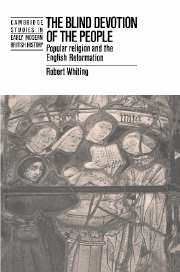Book contents
- Frontmatter
- Contents
- List of illustrations
- Preface
- Note
- 1 Introduction
- 2 Survey
- PART ONE ASSESSMENT
- PART TWO EXPLANATION
- 8 Spiritual motivations: Lutheranism, Calvinism and other faiths
- 9 Non-spiritual motivations: politics, economics and other forces
- 10 Mediate influences: literature, drama and art
- 11 Immediate influences: example, action and oral communication
- 12 Summation of Part Two
- 13 Perspective
- Appendix 1 Maps
- Appendix 2 Graphs
- Bibliography and abbreviations
- Index
10 - Mediate influences: literature, drama and art
Published online by Cambridge University Press: 11 December 2009
- Frontmatter
- Contents
- List of illustrations
- Preface
- Note
- 1 Introduction
- 2 Survey
- PART ONE ASSESSMENT
- PART TWO EXPLANATION
- 8 Spiritual motivations: Lutheranism, Calvinism and other faiths
- 9 Non-spiritual motivations: politics, economics and other forces
- 10 Mediate influences: literature, drama and art
- 11 Immediate influences: example, action and oral communication
- 12 Summation of Part Two
- 13 Perspective
- Appendix 1 Maps
- Appendix 2 Graphs
- Bibliography and abbreviations
- Index
Summary
Of the types of mediate influence available to the sixteenth-century propagator of religion, potentially among the most effective in the battle for men's minds was the written word. It is therefore significant that in the South-West the utilization of this medium by religious traditionalists would seem never to have been extensive. Evidence of the dissemination of Catholic books, pamphlets or even bills is in fact relatively scarce. At Exeter, it is true, ‘seditious bills’ supporting the opponents of iconoclasm were posted in 1536; a paper implying that Henry VIII was ‘cursed of God's mouth’ was discussed by some of the citizens in 1539; and ‘most slanderous and seditious bills’ were ‘affixed to doors and scattered in the streets’ in 1547. Thereafter such activity apparently subsided, though bills maintaining the doctrine of transubstantiation and denying the identification of the pope with Antichrist were erected in the city by a doctor in as late as 1561. One of the very few cases of this type to be reported from outside Exeter occurred at Alphington, where, in 1567, books written on the continent by the exiled Thomas Harding – and presumably smuggled thence into the South-West – were read by Thomas Stephens. Stephens, moreover, commended these works to Simon Hamlyn as ‘good and Catholic’, ‘did praise them above all measure’, and indeed read one of them aloud to John Alderhead and John Helmer.
- Type
- Chapter
- Information
- The Blind Devotion of the PeoplePopular Religion and the English Reformation, pp. 188 - 210Publisher: Cambridge University PressPrint publication year: 1989



